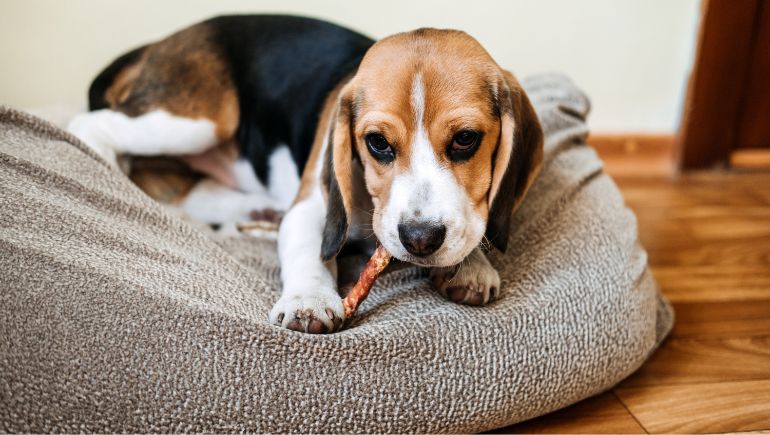Good vs Bad Chewing: What Are the Reasons?
Posted on January 19, 2024 by Team Gorilla

As cherished members of the family, playful pups bring joy, love, and a little mischief into your life. One such mischievous habit—the constant gnawing and biting—can sometimes leave our homes looking like the aftermath of a miniature tornado.
Know that you’re not alone if you’ve ever come home to find your favorite slippers in tatters, or your prized sofa looking suspiciously like a war zone! What are some of the reasons behind dogs’ good and bad chewing behaviors? Learn the answer and more in the article below.
The Reasons Behind Bad Chewing Habits
Ample Energy and Lack of Mental Stimulation
Dogs that don’t receive sufficient exercise or mental stimulation are more likely to tear up every item in the house they can find. This habit is especially prevalent in active breeds and puppies. These dogs may resort to tearing up household items to entertain themselves.
Regular exercise, both physical and mental, is crucial in preventing this destructive behavior. Establishing a consistent exercise routine, introducing brain-stimulating toys, and using interactive games can help to keep your dog’s mind and body sufficiently engaged, reducing the likelihood of destructive chewing.
Dental Problems
Your pup may be trying to alleviate discomfort caused by tooth decay, broken teeth, gum disease, or gum inflammation if they are chewing on particularly hard objects around the house or showing a sudden increase in chewing behavior.
Regular dental check-ups with the vet can help detect these issues early and provide your dog with the necessary treatment, reducing the need for them to self-soothe through destructive chewing. Providing your dog with dental chew toys or treats can also satisfy their urge to chew while alleviating discomfort.
Feelings of Stress and Anxiety
Just like humans, dogs experience anxiety and stress. They often cope with these emotions through destructive chewing.
Recognizing this behavior is crucial in managing the issue appropriately. Several signs may indicate that your dog is experiencing anxiety, such as when you notice your dog chewing more frequently during thunderstorms, when unknown guests are in the house, or when you’re away.
The Reasons Behind Good Chewing Habits
Reinforcing Good Chewing Behaviors
Positive reinforcement is a powerful tool for guiding your dog’s chewing behavior. Reward your pup with praise, petting, or a small treat when they choose to chew on their toys instead of inappropriate items.
On the contrary, when they engage in destructive chewing, it’s essential not to punish them but to redirect their attention to acceptable chew toys. Consistent reinforcement will improve their chewing habits because they understand the difference between good and bad behaviors.
Implementing Indestructible Items
It’s often found that when dogs cannot obliterate their toys, they become less likely to destroy various belongings. Giving your dog indestructible toys offers a constructive outlet for their energy. In return, they are less likely to succumb to destructive behaviors such as chewing on furniture or other household items.
For example, adding a non-chewable dog bed can significantly reduce your pup’s chewing habits because they cannot tear through the tough fabric. Eventually, these unwanted actions will stop.
Some of the reasons behind dogs’ good and bad chewing behaviors are extensive. Nevertheless, putting in the effort to promote positive behaviors will significantly improve your home’s presence and your dog’s well-being.
